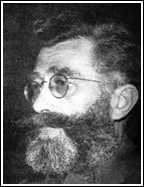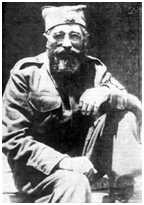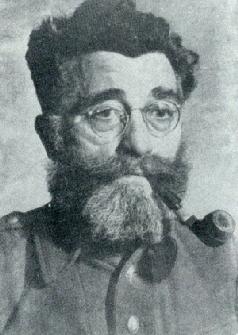

![]()
 |
A Short Biography of Draza Mihailovich
|
 |
|
Draza Mihailovich was born in 1893 in the small town of Ivanytza near Chachak, Serbia, Yugoslavia, where his father was a schoolmaster. In 1910 Mihailovich entered the Military Academy, but his studies were interrupted in 1912 when he took part in the SerboTurkish War as a Cadet-Corporal. Twice decorated for acts of bravery, he was promoted to Cadet- Sergeant and later to Second-Lieutenant in the Serbo- Bulgarian War, and participated in all operations. When the First World War broke out in 1914, Mihailovich served with his regiment and was decorated several times. He particularly distinguished himself in an action in September, 1918 near Shtip and was promoted to First-Lieutenant and decorated with the White Eagle. After the armistice, Mihailovich resumed his military studies. In 1929 he took a six months' course in the French Army. Promoted to Staff Offficer, then professor of tactics at the Higher College of the Military Academy, he was appointed Military Attache first in Soffa and subsequently in Prague. On the eve of the present war, Mihailovich submitted a report to the Yugoslav General Staff in which he forecast almost everything that took place in April, 1941. He was of the opinion that the idea of defending practically indefensible Northern frontiers should be abandoned and proposed concentrating all forces in mountainous regions where the overwhelming superiority of the German tanks would be ineffectual. Hewroteabook on guerrilla warfare which secured him a considerable following. At the time that war broke out Colonel Mihailovich was Chief of Staff of a motorised division in Doboy, a small town in Bosnia. When capitulation was ordered by General Simovich without the knowledge of the Yugoslav Government, he refused to accept it and resolved to try to break through with chosen troops in the direction of Eastern Bosnia and Serbia, where he hoped to find an established front, and to join up with the regular army. On the way there he and his men were attacked by strong German formations, which, after fierce fighting, routed the troops; the commander of the small tank formation was taken prisoner, while Mihailovich was forced to withdraw into the hills. Asked whether he had heard anything about the capitulation, Mihailovich answered: "Capitulation ? I do not know what capitulation is. l have served in the army for many years, but I have never heard this word." Ravna Gora Colonel Mihailovich arrived at Ravna Gora on May 8th, 1941, and there the first guerilla force was organised, not only the first in Yugoslavia, but the first in Europe; and for the first time on record in the countries of enslaved Europe a new way of opposing the conqueror was brought into effect. Mihailovich was appointed Major-General on December 7th, 1941; Minister of War on January 11th, 1942; and Lieutenant- General on January 19th, 1942. Finally on June 17th, 1942 he was appointed General and Deputy Commander-in-Chief. Germany became alarmed. General Dankelmann, Military Governor of Serbia, asked for reinforcements; but the German Army was too deeply involved in Russia, and it was impossible to deplete the Russian front. The German General attempted to arrange an armistice with Mihailovich, but the latter laid down certain conditions. He agreed to receive the German envoys, nevertheless his terms proved unacceptable to the Germans. "I demand", he said, "that the German troops evacuate my country and then peace will be restored. As long as a single enemy soldier remains on our soil we shall continue to fight." Throughout Yugoslavia Mihailovich and his men were concealed everywhere: in the hollow recesses of the plains of the Srem and Backa regions, in the mountains of Serbia, Bosnia and Herzegovina, amid the granite boulders of Montenegro; some were found scattered in villages which had been razed to the ground; others lurked behind the rocks of the Southern Adriatic coast; while sometimes they lived underground, hidden in secret munition dumps and caves. They lay in ambush in the ruins of bombed houses from which they would suddenly dart out and wreak vengeance on the enemy, whether German, Bulgar, Mihailovich's men hovered like vultures over enemy camps ever ready to pounce upon their prey. Whereas the Germans succeeded in recruiting legionaries and volunteers for service with the Wehrmacht amongst almost every conquered and satellite people in the world, yet the Serbs and the Poles never contributed a single military unit in support of the enemy. The Germans would no longer tolerate this kind of resistance. They sent their well-known Strafexpeditionen, and the fight began again. The reprisals were appalling. They will remain for all time a symbol of German barbarism, for the Germans killed for the sake of killing. On January 19th, 1943, a new proclamation from General Bader the Commander of me German Forces, was issued against General Mihailovich. "A group of rebels, under the leadership of the former Colonel Drazha Mihailovich, is continuing to fight," said General Bader. "These rebels give themselves out to be the regular Yugoslav Army and they are endeavouring to prolong the war, which was brought to a conclusion by the armistice that has been duly signed...." Warfare went on unabated and General Mihailovich sent the following message to General Bader: "A year and half has elapsed since I undertook this life-and- death struggle to exterminate the invaders on Yugoslav soil... Our fighting spirit is based on our traditional love of liberty and on our unflinching faith in the victory of our Allies... For every German soldier killed or missing, you ordered the shooting of 50 to 100 innocent and defenceless Serbian people. l wish to draw attention to the fact that the day of judgment is not far off. I warn you that if you continue to use savage reprisals I will use the same measures against German soldiers... " 1,000,000 Dollars Dead or alive On July 20th, 1943, the Axis-controlled Press published a proclamation offering a reward of 100.000 gold marks for the capture of Mihailovich, dead or alive. His men were being killed, seized or arrested. His followers were being questioned, tortured and imprisoned; they were also being sent to work in the mines. In spite of me extremely precarious situation, in spite of German reprisals, in spite of lack of arms and ammunition, General Mihailovich continued to exert his organized military resistance. For military intervention supporting the Allied cause, especially at the most critical moment when Rommel's Afrikakorps stood before El-Alamein, General Mihailovich received congratulations and thanks from the Allied Commanders. General Eisenhower, General Auchinleck, Air- Marshal Tedder, Admiral Harwood and General de Gaulle emphasized the importance of his help. Once again the Yugoslav David defied a Goliath; and this time successfully. We owe that military success to the Yugoslav people and their leader, Mihailovich. After the Teheran Conference, General Mihailovich was sacrificed for reasons of high political expediency. In the Autumn of 1944, he was abandoned by the Great Allies and as his attempts at cooperation with the advancing Red Army had been rejected, General Mihailovich demobilized the greater part of his forces. In September, 1944, when his position was becoming precarious, the Americans offered to get him out of the country. General Mihailovich replied: "I must stay with my people. My strength is in the people." And he stayed with his people. The Red Army entered Belgrade on October 20th, 1944, to enthrone Tito, a Russian emissary, against the will of the great majority of the Yugoslav people. General Mihailovich remained with his people who guarded him and provided for his needs. Last Known Letter of Draza Mihailovich After five long years spent in the mountains the state of General Mihailovich's health caused anxiety to those around him. He was begged to leave the country for a while. He categorically refused to consider taking such a step, and, in a letter - the last one written by him - he says: "Under no conceivable circumstances will l leave my country and my people... The Communists are devoting all their efforts to capture me... On several occasions I have been in desperate straits... You know my strategic purpose - to maintain myself at all costs for the great task which lies ahead. It may be that I shall fall in our sacred cause. But you all know well that this would not mean that the righteous cause for which our nation is fighting would fall with me...'." General Mihailovich fell seventeen months after the so-called "liberation" of Yugoslavia. Reports from Belgrade on March 24th, 1946, announced his capture under puzzling circumstances on March 13th, 1946. His trial before a Communist military court began on June 10th, 1946. He was "sentenced" to death on July 15th, 1946, and murdered on July 17th, 1946. Draza Mihailovich - A Legend General Mihailovich is no more. He has departed this world convinced that he was abandoned by the Allies. The voices that were raised abroad in his defense were not allowed to reach him and he died without the satisfaction of knowing that in the opinion of many he died an innocent man and a great soldier. General Mihailovich is no more, but the legends of his heroic deeds are becoming more and more popular and they live in the hearts of the people. General Mihailovich is no more. He has departed this world. Those who murdered him have not only perpetrated a crime, they have also committed a grave mistake, for democratic public opinion is well aware of General Mihailovich's merits. General Mihailovich is no more. The last words of this great patriot were concise and poignant. He said: "I strove for much, l undertook much, but the gales of the world have carried away both me and my work." The Deeds of Draza Mihailovich When General Mihailovich first organized his resistance against the invader in the Summer of 1941, he carried out extensive operations. His task was complicated from the first by the necessity of defending the Serbs against the Ustashis who were attempting to massacre them out of all existence. The appalling reprisals carried out by the Germans together with the small likelihood of receiving much help from abroad, obliged the General to alter his tactics. He adopted guerrilla tactics. His troops were active everywhere carrying out sabotage and well-thought out operations. At the same time he set out a widespread and powerful military organization in the greater part of the country to prepare for large scale operations when the Allies should land. General Mihailovich undertook major operations at four periods:
During the whole of this period, from 1941 to the end of 1944, General Mihailovich's forces were continually carrying out sabotage activities, wrecking enemy trains, attacking important enemy positions and lines of communication, and rescuing Allied airmen who had been forced down over Yugoslavia. Apart from guerrilla warfare against the enemy, General Mihailovich's troops protected the civilian population from German reprisals and requisitions and also from the terroristic methods of the Partisans. The Central National Committee, on which Croats and Slovenes were represented as well as Serbs, has repeatedly made it clear in messages endorsed by General Mihailovich that its movement was purely democratic and aimed only at the liberation of Yugoslavia by such methods which did not involve the physical annihilation of its population nor their enslavement by a dictatorship, whatever its colour or foreign sympathies. The National Assembly held in the mountains in January 1944 once again gave clear and unequivocal expression to these aimed, though their resolutions were given little publicity in the outside world.
|

![]()
Copyright © 2000